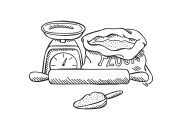We connect library patrons with cooking by highlighting many items of interest at the library centered around “cooking”. Chefs Move to Libraries connects cooking with math, science, language arts and social studies.
We call this “Food Literacy“.
For younger kids, it covers speech, for older kids it involves written communication, research and developing a passion for having interests and hobbies. Presentations can include science and history, geography, math, culture, life skills and art.
Programs can cover holidays, career development, special people of interest, and celebrations of different cultures.
Chefsville Educational Services at Libraries:
• Parenting classes: Topics can include food safety; what directions the public schools and the USDA are going in regarding to children’s nutrition services; working with children in the kitchen; modeling positive constructive behaviors in the kitchen with kids; relationship building, creative family cooking, brainstorming ways to present food attractively; developing nutritious meals; and making family memories around the kitchen table. These classes do not have to contain cooking demonstrations, but classes can.
• Meet-the-Farmer/Meet-the-Chef: where local farmers and Chefs are invited to the library to participate in seasonal tastings and celebrate where, when and how our food grows.
• Open Houses: providing healthy snacks at every library functions as opposed to sugary desserts or drinks to show families how delicious and easy eating fresh foods can be. Work with library staff to educate families on how increased nutrition and better eating habits can result in improvements in child’s academic, emotional and social performance.
• Hands-on Cooking Classes: Teach kids and families to cook and taste fresh, healthy foods that are locally and sustainably grown. Get their input on what kinds of foods they would like to eat at home. Create healthy alternatives and cook those foods together.
• Town Hall meetings: Presentation of concepts of community health and nutrition where cooking, eating and physical activity are important and its practice will result in healthier families. Topics will help bridge a gap for family practice of a healthier lifestyle.
• Plant a Garden/Help maintain a Garden: Show kids where their food comes from by planting a garden. Local gardeners can discuss and hold a harvest party and prepare recipes using fruits and vegetables from their community gardens.
• Library Cookbook: Invite kids, library staff members and families to submit their favorite healthy recipes and create a community-wide cookbook of healthy recipes.
• Organize a Family Food and Fun Night: Provide samples for parents and kids to taste and rate new food items that are being considered for the school lunch or breakfast programs.
• Student Council/Youth Advocacy Committee: Off-campus meetings to work with student organizations to identify opportunities for change to the existing school food program. Brainstorm alternative menus and hold tastings to get students involved.
• Cooking Club: Lead a community cooking program for interested families. Family members can learn more about their own food culture or investigate other cultures around the world.



